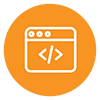What's New in JDT?
The JDT will have had four new releases since last fall's EclipseCon. This session will discuss the various new JDT features that have been added since then with emphasis on enhancements that aren't introduced as part of support for new Java language features. Such features include new cleanup/quick fixes, enhanced completion support, formatting, and debug enhancements.
The session will include live demos including relevant code samples.

Java & JDT